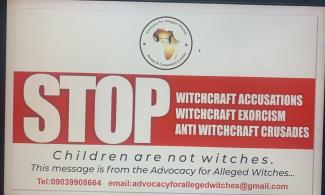
The Advocacy for Alleged Witches urges Africans to stop attributing crocodile attacks to witchcraft because such attributions have no basis in reason, science or reality. This statement follows the reported killing of a man accused of magically causing a crocodile to kill a woman in northern Zambia in March.
Four persons linked to this incident were lynched. There have been reports of other cases of crocodile attacks that have been attributed to witchcraft in other African countries.
In Karonga, Malawi, the mob set ablaze a couple following suspicion that they were responsible for mysterious crocodile attacks in 2015. In this case, a crocodile from a nearby river attacked and killed three people in the community. And residents alleged that this reptile belonged to the couple who used the animal to kill people. Based on this allegation a mob lynched the couple.
In a related development, some residents banished an elderly man after linking him to some crocodile attacks in Dombe, Mozambique in 2019. Elderly persons are often suspected of indulging in occult practices.
Hence, they are prime suspects when 'mysterious' deaths take place in families. These accusations are based on the belief that these persons turned into crocodiles and subsequently attacked or killed their victims. Many Africans believe that humans can turn into animals to perpetrate occult harm. Others think that people can magically control or manipulate cats, rats, birds, and crocodiles to harm or injure their enemies.
Incidentally, these claims are baseless. They are superstitious notions and they motivate people to scapegoat and justify the cold-blooded murder of innocent persons. It is necessary to delink crocodile attacks and witchcraft because they are not connected in any way. Africans should know that crocodiles are carnivores. They eat all types of animals, including human beings.
So crocodile attacks are 'crocodile-craft' not witchcraft. They have nothing to do with occult imaginaries and suppositions. Witchcraft is an unwarranted explanation for such attacks. It is an unnecessary or unneeded facility to explain crocodile attacks.
However, the attribution of crocodile attacks to witchcraft persists and continues to wreak havoc in the communities due to fear and ignorance. Occult explanations are seen as cultural, and a part of the African social formation. Hence, attacks linked to these attributions are not treated with the urgency they deserve. People are reluctant to call out these superstitious beliefs and behaviors.
Western anthropologists explain them as making sense to Africans and as constitutive of African modernity. They are unwilling to criticize these mistaken ideas and irrational notions. At best, they explain witchcraft ideas in ways that reinforce, not weaken the beliefs.
Very often, criticism of these superstitious ideas is seen as disrespectful of African culture and tradition. But this misguided scholarship must stop. Critical analysis of mistaken beliefs and harmful cultural practices is an intellectual and moral duty. A critical evaluation of African traditions should be encouraged.
The misrepresentation of cultural beliefs and behaviors as beneficial to African communities must stop. Superstition is superstition everywhere, whether in Africa or America, whether for Africans or Europeans. Witchcraft does not mean one thing to westerners and another thing to Africans. There is no intellectual or scholarly value in representing or misrepresenting the attribution of crocodile attacks to witchcraft as a part of African science or modernity. Science or modernity are universal canons.
But this racist and wretched scholarship will not disappear until African scholars wake up. African students need to disrupt this explanatory paradigm. A radical shift in the study of African witchcraft is needed. A scholarly awakening is imperative.
African scholars and students should come forward and challenge the misconceptions and misrepresentations. The romanticization of African witchcraft must stop. African scholars should vigorously question, debate, and dispute the narratives that link crocodile attacks, snake bites, and thunderstorms to witchcraft. Those who peddle or profit from these narratives must be called out and held to account.
Public awareness programs must be staged in the communities to educate and enlighten the people. Health education should be promoted in the communities to dispel misinformation and disinformation about the cause of death and illness and encourage an understanding of nature and how nature works. Science education and critical thinking should be used to weaken the grip of magical thinking and other superstitious notions on the minds of Africans.
Leo Igwe directs the Advocacy for Alleged Witches